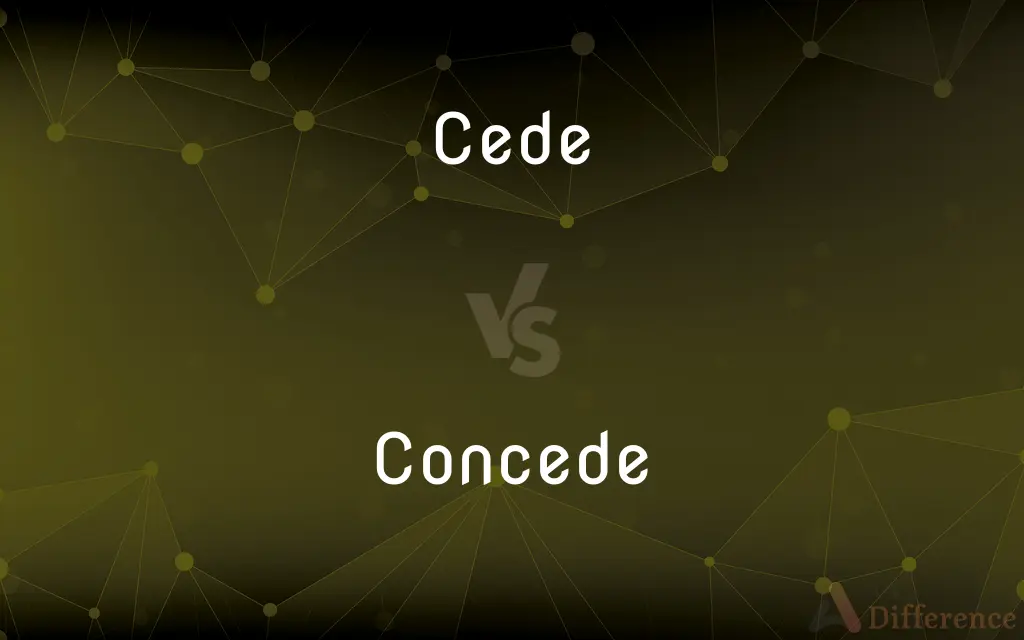Cede vs. Concede — What's the Difference?
By Tayyaba Rehman & Urooj Arif — Updated on April 23, 2024
Cede involves the formal surrender of control over territories or rights, whereas concede often pertains to acknowledging defeat or the validity of a point in arguments.

Difference Between Cede and Concede
Table of Contents
ADVERTISEMENT
Key Differences
Cede is typically used in the context of territorial or rights transfers, often involving formal agreements or treaties. Whereas, concede generally relates to admitting or yielding in less tangible contexts like debates or personal admissions.
In legal and political contexts, ceding territory or authority usually signifies a permanent relinquishment. On the other hand, conceding in a debate or election does not imply a transfer of physical assets but rather an acknowledgment of defeat or acceptance of an opposing view.
Cede often requires official documentation and is a term used in formal or state-level discussions. Whereas, concede can occur in both formal and informal settings, not requiring any legal formalities.
While ceding might impact the sovereignty or control of a state or organization, conceding affects the perceived correctness or position of an individual or group.
Conceding can also imply a strategic retreat or compromise to achieve a broader agreement or peace, distinct from the often irreversible nature of ceding.
ADVERTISEMENT
Comparison Chart
Usage Context
Formal agreements, especially international territories.
Debates, elections, personal admissions.
Implication
Permanent transfer of rights or control.
Acknowledgment of defeat or validity of an argument.
Requirement
Official documentation and legal formalities.
No formal documentation required.
Impact
Affects sovereignty or control of states/organizations.
Affects positions or perceptions in discussions.
Common Settings
Political, legal.
Personal, political, informal or formal discussions.
Compare with Definitions
Cede
To relinquish rights or possessions.
He ceded his inheritance rights to his sibling.
Concede
To give in or yield in an argument for peace's sake.
She conceded the argument to maintain harmony in the group.
Cede
To give up power or territory.
The country ceded the disputed area after the treaty was signed.
Concede
To acknowledge defeat in a contest or election.
The candidate conceded the election once the results were clear.
Cede
To surrender control formally.
The corporation ceded management to the newly formed committee.
Concede
To grant or yield under pressure or duress.
Under intense questioning, he conceded that he was present at the scene.
Cede
To yield or grant something often reluctantly.
The king ceded the lands to the invading forces.
Concede
To admit as true or valid after initial denial or resistance.
He conceded the point after hours of debate.
Cede
To allow another entity to take over responsibilities.
The government ceded regulatory duties to an independent agency.
Concede
To allow or acknowledge reluctantly.
The professor conceded that there might be other valid interpretations.
Cede
Give up (power or territory)
In 1874, the islands were ceded to Britain
Concede
Admit or agree that something is true after first denying or resisting it
I had to concede that I'd overreacted
‘All right then,’ she conceded
Cede
To surrender possession of, especially by treaty.
Concede
Surrender or yield (a possession, right, or privilege)
In 475 the emperor conceded the Auvergne to Euric
Cede
To yield; grant
The debater refused to cede the point to her opponent.
Concede
To acknowledge, often reluctantly, as being true, just, or proper; admit
Conceded that we made a mistake.
Cede
(transitive) To give up; yield to another.
Edward decided to cede the province.
Concede
To acknowledge or admit (defeat).
Cede
(intransitive) To give way.
Concede
To acknowledge defeat in
Concede an election.
Concede a chess match.
Cede
To yield or surrender; to give up; to resign; as, to cede a fortress, a province, or country, to another nation, by treaty.
The people must cede to the government some of their natural rights.
Concede
To yield or surrender (something owned or disputed, such as land)
Conceded the region when signing the treaty.
Cede
Give over; surrender or relinquish to the physical control of another
Concede
To yield or grant (a privilege or right, for example).
Cede
Relinquish possession or control over;
The squatters had to surrender the building after the police moved in
Concede
(Sports) To allow (a goal or point, for example) to be scored by the opposing team or player.
Concede
To make a concession or acknowledge defeat; yield
The losing candidate conceded after the polls had closed.
Concede
To yield or suffer; to surrender; to grant
I have to concede the argument.
He conceded the race once it was clear he could not win.
Kendall conceded defeat once she realized she could not win in a battle of wits.
Concede
To grant, as a right or privilege; to make concession of.
Concede
To admit or agree to be true; to acknowledge.
Concede
To yield or make concession.
Concede
(sports) To have a goal or point scored against
Concede
(cricket) (of a bowler) to have runs scored off of one's bowling.
Concede
To yield or suffer; to surrender; to grant; as, to concede the point in question.
Concede
To grant, as a right or privilege; to make concession of.
Concede
To admit to be true; to acknowledge.
We concede that their citizens were those who lived under different forms.
Concede
To yield or make concession.
I wished you to concede to America, at a time when she prayed concession at our feet.
Concede
Be willing to concede;
I grant you this much
Concede
Give over; surrender or relinquish to the physical control of another
Concede
Acknowledge defeat;
The candidate conceded after enough votes had come in to show that he would lose
Common Curiosities
How does cede affect international relations?
Ceding territory or rights can significantly impact international relations, often altering geopolitical boundaries and alliances.
Can a company cede its responsibilities?
Yes, a company can cede its responsibilities, typically by transferring them to another entity through a legal agreement.
What is an example of conceding in a personal relationship?
In a personal relationship, conceding might involve admitting one's mistake in an argument to resolve a conflict.
What are the consequences of not conceding in a democratic process?
Not conceding in a democratic process can lead to political unrest, undermine democratic norms, and delay transitions of power.
Why might a leader decide to concede defeat in an election?
A leader might concede defeat to maintain political stability, acknowledge the democratic process, and begin the transition of power smoothly.
Can conceding be seen as a sign of weakness?
While sometimes viewed as a sign of weakness, conceding can also be seen as an act of honesty, responsibility, and strategic thinking.
What does it mean to cede land?
To cede land means to formally surrender control and ownership of it, usually as part of a treaty or legal agreement.
Is conceding the same as losing?
Conceding often involves acknowledging defeat or error, but it can also be a strategic decision to yield for greater benefit or peace.
How does cede differ from relinquish?
Cede is often more formal and involves legal or official transfers, while relinquish is more general and can refer to letting go of anything.
Does ceding always involve territory?
While often involving territory, ceding can also include rights, responsibilities, or control over various entities or assets.
Share Your Discovery

Previous Comparison
Though vs. However
Next Comparison
Gather vs. ObtainAuthor Spotlight
Written by
Tayyaba RehmanTayyaba Rehman is a distinguished writer, currently serving as a primary contributor to askdifference.com. As a researcher in semantics and etymology, Tayyaba's passion for the complexity of languages and their distinctions has found a perfect home on the platform. Tayyaba delves into the intricacies of language, distinguishing between commonly confused words and phrases, thereby providing clarity for readers worldwide.
Co-written by
Urooj ArifUrooj is a skilled content writer at Ask Difference, known for her exceptional ability to simplify complex topics into engaging and informative content. With a passion for research and a flair for clear, concise writing, she consistently delivers articles that resonate with our diverse audience.














































